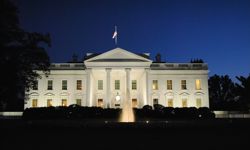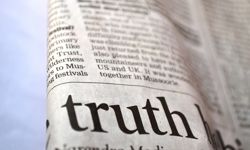
Donald Trump had just been inaugurated as President of the United States, with a visibly smaller audience than at Barack Obama’s inauguration four years earlier. But he sent his spokesman Sean Spicer out to tell the media this was: “The largest audience to ever witness an inauguration. Period.” This set the tone for a Trump presidency in which Trump told more than 30,000 lies, according to fact checkers at the Washington Post.
On the other side of the Atlantic, ‘Britain Trump’ [sic] Boris Johnson had triumphed in the EU Referendum campaign in 2016 by lying repeatedly about the benefits of leaving the EU (£350 million a week for the NHS) and the dangers of remaining in the bloc (common borders with Turkey). Aided and abetted by a Eurosceptic, right-wing press, Johnson achieved his ultimate goal of becoming World King (Prime Minister of the UK) in December 2019. His premiership has seen no let-up in the number of lies he tells. Assessing Johnson’s record in his first year, Guardian writer Simon Hattenstone described the Prime Minister as an ‘inescapable, comprehensive liar’.
Large sections of the public in the UK and the US either do not know, or do not care their leaders are inveterate liars.
Inveterate liars? We don’t care
But both Johnson and Trump still have big fan bases. Trump lost the election (even though he still denies it) but he won 74.6 million votes, more than any other presidential candidate in history apart from his opponent Joe Biden. Johnson has an 80-seat majority in Parliament after running on a ‘Get Brexit Done’ ticket, and, thanks to the successful vaccination campaign in the first half of 2021, has seen his approval levels surge.
This suggests something very disturbing – large sections of the public in the UK and the US either do not know, or do not care their leaders are inveterate liars. The idea that there is a verifiable account of events and this is part of public discourse in a democratic society with a free press has increasingly become questionable, even naïve. For journalist Peter Oborne, this is a disaster. “Truth has been captured by the Government and turned into a political weapon. For centuries we have had an area of public discourse which belonged to everybody, a common ground where rival parties could exist”.
A populist platform and a theft of democratic rights
Both Trump and Johnson came to power on a populist platform, promising to restore national greatness, to roll back the powers and involvement of supranational groups like the EU, and to make the voice of ordinary people heard. A big part of their appeal was they told people what they wanted to hear, which frequently entailed lying on an epic scale. Oborne argues this constitutes a form of theft. “It takes away people’s democratic rights. Voters cannot make fair judgements on the basis of falsehoods. Truth has been taken out of the public domain”.
In this environment, mainstream journalists struggle to gain and maintain public trust. YouGov’s regular survey into trust in journalists carried out in March 2020 showed only 40 per cent of respondents trusted broadsheet newspapers, with a tiny eight per cent trusting red-top tabloids. Competition from social media and the spread of fake news makes it more difficult for the public to distinguish truth from lies and, judging by the enthusiasm of voters for Trump and Johnson, many have given up trying.
A serious challenge for ethical journalism
This is a serious challenge to journalists who still put core ethical values of accuracy, truth-telling, balance and transparency at the centre of their work, and seek to call out government lies. In a liberal democracy, part of journalists’ roles is to act as watchdogs for the public and scrutineers of the powerful and this is complicated by the refusal of politicians to submit to interviews, to be questioned in public and to answer truthfully. It is more difficult for journalists to act as ‘guardians of democracy’ if they cannot obtain information voters can rely on to make decisions. More worryingly for journalists trying to get behind the bluster and the obfuscation are attempts to smear them and their industry as ‘enemies of the people’ who produce ‘fake news’.
Competition from social media and the spread of fake news makes it more difficult for the public to distinguish truth from lies.
Ducking and weaving…
Populists like Trump and Johnson duck and weave to avoid scrutiny. They tell their followers that sections of the media who do not follow their version of the story are part of the problem because they are part of the elite who do not understand and engage with ordinary people, successfully turning people against journalists. Johnson consistently refuses to submit to questioning from journalists he knows will give him a grilling. He and his ministers have declined to appear on Channel 4 and Newsnight and have boycotted Good Morning Britain, with its former presenter, the combative Piers Morgan. Journalist Simon Kelner writes that the refusal to appear on GMB ‘reveals the monumental historic arrogance of this government’.
In February 2020, journalists from a number of left-leaning UK press organisations including the Daily Mirror and The Independent were banned from a briefing at Number 10, a ploy which backfired as all the invited journalists promptly boycotted the briefing. More broadly, the Conservatives have threatened whole media organisations with loss of funding, claiming the BBC has a left-wing bias and is being taken over by the ‘woke’ brigade, so should lose its licence fee. Johnson has also threatened to privatise Channel 4, which is publicly funded and which frequently runs hard-hitting investigative news programmes.
In the US, Trump’s labelling of any negative coverage of him as ‘fake news’ and his depiction of journalists as ‘enemies of the people’ has created a hostile environment for media outlets such as CNN, but also journalists generally, as Trump supporters follow him in attacking the media. In a grim illustration of the Trump effect on the media, and the shift from verbal to physical threats, the words ‘murder the media’ were scrawled on a door during the invasion of the Capitol in January 2021.
Refusal to submit to rightful scrutiny and to listen to unwelcome but important advice has led to tragic outcomes.
Tragic and avoidable outcomes
Refusal to submit to rightful scrutiny and to listen to unwelcome but important advice has led to tragic outcomes both in the UK and the US during the Covid pandemic. Nearly 700,000 people in the two countries have died of Covid-19 as at March 23, 2021. Both Trump and Johnson have distinguished themselves by their disastrous belated response to the seriousness of Covid, which has led to unnecessary deaths. Johnson’s refusal to fire his chief adviser, Dominic Cummings after it emerged Cummings had driven to County Durham with his family in breach of lockdown regulations in May 2020 seriously dented the credibility of the Government’s message to ‘Stay Home’. In a bizarre televised press conference, Cummings assailed the assembled journalists with a story about needing to drive to Barnard Castle to test his eyesight, and refused calls to resign. Taking a leaf out of the Trump playbook, Number 10 declined to respond to the revelations from The Guardian and Daily Mirror, dismissing them as ‘false accusations’ from ‘campaigning newspapers’.
Professor Charlie Beckett comments in The Guardian that the Johnson Government’s refusal to engage with legitimate questions from the media was an echo of Trump’s approach: “For example, attacking the fact-based revelations in the Mirror and the Guardian as ‘inaccurate’ (in what way? tell us!) and as ‘campaigning’ journalism (implying it is partisan and discountable). It is similar to Trump’s cry of ‘fake news’ about any hostile coverage. By attacking the motive of the accuser, you avoid addressing the actual charge.”
Media attacks, propaganda and populism are not new
Attacks on the media are not new. The emergence of a free press in the UK was hard won, with successive governments since the seventeenth century suppressing unwelcome criticism with censorship, taxes on everything from newsprint to advertising, and imprisonment for editors who refused to comply. Within recent memory, prime ministers have gone head-to-head with media outlets – consider Margaret Thatcher’s Conservative administration clamping down on BBC coverage of Northern Ireland during the Troubles, or Tony Blair’s Labour Government furiously attacking the BBC for alleging the Government ‘sexed up’ a dossier of evidence designed to encourage public support for war in Iraq, as just two examples.
Using the media to influence the public is not new. In the UK, for example, ever since mass media took shape at the end of the nineteenth century and the beginning of the twentieth, governments have used media to spread propaganda and generate popular support for causes such as wars and imperial expansion, helped by the press barons who shaped the tabloid and broadsheet newspapers of today.
Populism is not new, although the combination of Trump and Johnson in power at the same time has led to much discussion about why people are voting for them and in the UK, why they supported Brexit. Eatwell and Goodwin (2018) argue these are the wrong questions, asked by journalists and others who see populism as a short-term phenomenon, without understanding deep-seated and long term trends of distrust of politicians, a perceived destruction of national identity and established ways of life, relative deprivation and ‘left-behindness’ and de-alignment with mainstream political systems, all factors which led to Trump in the US and Brexit in the UK.
What is arguably new is the extent to which leaders like Trump and Johnson … habitually attempt to gaslight journalists and the public.
But now governments are gaslighting us
But what is arguably new is the extent to which leaders like Trump and Johnson, running governments in sophisticated democracies in peacetime, habitually attempt to gaslight journalists and the public, tell lies which they must know will be called out and engage in a form of censorship by refusing to submit to scrutiny from all sections of the press, rather than just friendly media like Fox News in the US or the tabloid press in the UK.
Those journalists who still believe ethics are ‘not some optional extra’ might justifiably feel they are fighting an uphill battle to gain public trust in the face of distorted or frankly wrong information which some newspapers have been pouring out for years. Harding points out the UK has had the most Eurosceptic press in the bloc since Britain joined in 1973, particularly The Sun, Daily Mail and Daily Express (Sample headline: ‘Now EU wants to ban our kettles’). Coverage by these newspapers contributed substantially to suspicion and hostility to Europe and to the Brexit vote, with the connivance and support of those now in power. A weak system of self-regulation allowed the lies to continue.
Not an insuperable challenge
From an ethical point of view, governments’ refusal to engage with the media, creation of a hostile environment for media scrutiny and disregard for truth, are a challenge for responsible journalists. But not an insuperable challenge. As the discussion above suggests, both the UK and the US still have a free press, and journalists ready and willing to call out government lies and obfuscation. The Washington Post counted and exposed Trump’s lies during his administration. The Guardian and Daily Mirror exposed Cummings. The Sunday Times, even though it is a Conservative paper owned by Rupert Murdoch, has carried a number of damning pieces by its Insight team of investigative reporters, exposing Johnson’s cavalier behaviour during the Covid epidemic. A number of fact-checking operations, such as FullFact and the BBC’s RealityCheck now work to check ministers’ claims and highlight distortions and inaccuracies.
But as Oborne argues, these successes must be set against the collective failure of many media outlets to challenge Johnson, both for his role in the Brexit vote and his rise to the premiership. Far from challenging him, the mainstream press overwhelmingly supported him in his race to Downing Street on a Brexit platform and failed to hold his feet to the fire when he insisted his Brexit deal meant the UK had ‘freedom in its hands’. As Oborne says: “Future generations are bound to ask why Johnson’s record as a liar, a charlatan and a cheat did not prove fatal on his way into Downing Street… one reason is that the mainstream press ignored Johnson’s lies”.

This is an abridged version of a chapter from the new book 'Populism, the Pandemic and the Media' edited by John Mair, Tor Clark, Neil Fowler, Raymond Snoddy and Richard Tait and published by Abramis.












